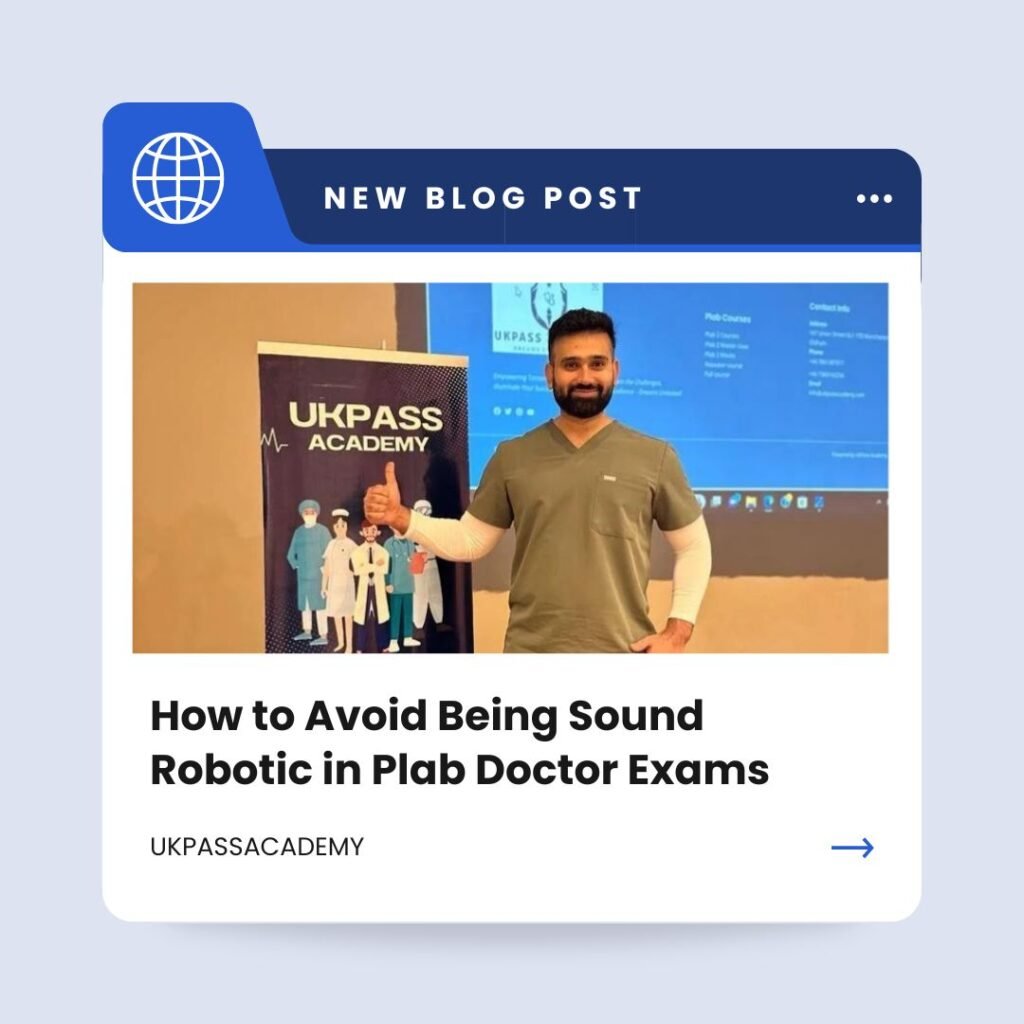Greetings future PLAB 2 examinees! Dr. Zeeshan here from UK Pass Academy, where we’re dedicated to preparing you thoroughly for your PLAB 2 journey. Today, let’s dive into why relying on scripts might not be the most effective strategy for exam success.
PLAB 2’s scripted approach has the drawback of missing important cues from patients. Scripts force you to focus more on what’s next than the broader conversation. The result is that verbal and non-verbal cues are often overlooked, resulting in incomplete patient data collection.
Tunnel vision occurs when scripts are followed. Instead of relying on scripts, it is beneficial to develop active listening skills and engage in genuine conversations with patients during PLAB 2 exams. By actively listening, you can pick up on important cues, both verbal and non-verbal, that can provide valuable information for patient data collection. This approach allows for a more comprehensive understanding of the patient’s condition and enhances your ability to provide appropriate care. This approach also helps to build patient trust, as it allows patients to feel heard and respected. Additionally, active listening can help to uncover potential issues or risks associated with the patient’s condition that may not be revealed in a script.
Missing cues impact your scoring ability
A comprehensive understanding of the patient’s condition is crucial for providing appropriate care and scoring high in PLAB 2 exams. By actively listening and engaging in genuine conversations with patients, you can pick up on important cues that might be missed with scripted approaches. This enables you to gather comprehensive patient data, including both verbal and non-verbal cues, which in turn enhances your ability to make accurate diagnoses and develop effective treatment plans.
Importance of adaptability to clinical scenarios.
Seeing Beyond the script , being adaptable in clinical scenarios allows doctors to respond effectively to unexpected changes or challenges that may arise during patient interactions. This flexibility enables them to tailor their approach to the specific needs of each patient, ensuring that they receive the best possible care. By being adaptable, doctors can also demonstrate empathy and understanding, building trust and rapport with their patients, which in turn can lead to better patient outcomes. Overall, adaptability plays a crucial role in enhancing patient care and improving the overall quality of healthcare delivery.
Holistic patient management is the key. Research has shown that there is a strong correlation between a doctor’s adaptability and positive patient outcomes. By being adaptable, doctors can quickly adjust their treatment plans and strategies based on the evolving needs and conditions of their patients, leading to more effective and personalized care. This adaptability also allows doctors to explore alternative approaches and consider the patient’s preferences, resulting in improved patient satisfaction and adherence to treatment plans. Ultimately, the ability to adapt in clinical scenarios is vital for achieving holistic patient management and ensuring the best possible outcomes in healthcare.
Patient-Centered Approach
When you rely on scripts, your focus shifts inward. You become more concerned with what you need to say or do next rather than actively listening and responding to the patient. This doctor-centric approach can hinder effective communication and patient rapport during the exam.
Patient-Centered Communication: A Catalyst for Success,Patient-centered communication is crucial in healthcare as it focuses on actively listening and responding to the patient’s needs, concerns, and preferences. By adopting a patient-centered approach, doctors can build trust, enhance patient satisfaction, and improve overall healthcare outcomes. It allows for a collaborative and empathetic relationship between the doctor and patient. This leads to better communication, shared decision-making, and ultimately, more effective and personalized patient care.
Importance of patient-centered care. Patient-centered communication is essential for building trust between doctors and patients. When doctors actively listen and respond to patients’ needs, concerns, and preferences, it creates a sense of validation and respect. This, in turn, fosters a stronger doctor-patient relationship, where patients feel valued and understood. Trust becomes the foundation of this relationship, enabling open and honest communication, shared decision-making, and ultimately, better patient outcomes.
Use Natural Language
One of the key ways to avoid sounding robotic in the PLAB doctor exams is by using natural language. This means avoiding overly formal or academic language and instead speaking as you would in everyday conversations. Use simple words and phrases that are commonly used and understood. Avoid using jargon or medical terminology that may not be familiar to the PLAB examiners.
Expand on Sentences
Another tip to avoid sounding robotic in the PLAB doctor exams is to expand on your sentences. Instead of providing short answers, try to explain your thoughts and reasoning in more detail. This will demonstrate your understanding of the subject matter and show the examiner that you have thought about the topic beyond the basic level.
Engage in Conversation
Instead of simply reciting information, try to actively engage in conversation with the examiner. Ask relevant questions, give examples to support your ideas, and engage in small talk to establish a rapport. This will demonstrate your ability to communicate effectively and show that you are interested in the subject matter.
Practice and Prepare
To avoid sounding robotic in the PLAB doctor exams, it is essential to practice and prepare in advance. Familiarize yourself with the exam format, know your strengths and weaknesses, and practice speaking aloud. Seek feedback from friends and colleagues to identify areas where you can improve.
You may feel overly confident in your prepared responses, neglecting to actively assess and manage the patient’s evolving needs during the exam. This complacency can significantly impact your performance and scoring potential.
Why complacency is detrimental in PLAB 2. One alternative approach to script-based communication is to focus on developing strong foundational skills, such as active listening, empathy, and effective questioning techniques. By honing these skills, healthcare professionals can adapt to each patient’s unique needs and actively engage in meaningful conversations, rather than relying on predetermined scripts.
Conclusion
In conclusion, while scripts may seem like a shortcut to exam preparation, they ultimately hinder your ability to perform well in PLAB 2. By avoiding scripted approaches and embracing a more adaptive and patient-centered strategy, you’ll enhance your chances of success. Remember, flexibility and readiness to respond to the unexpected are key to mastering PLAB 2
For more tips and resources on PLAB 2 preparation, explore our comprehensive PLAB 2 courses at UK Pass Academy. Let’s ensure you’re fully prepared to excel in your PLAB 2 exam and embark on your medical career with confidence.

